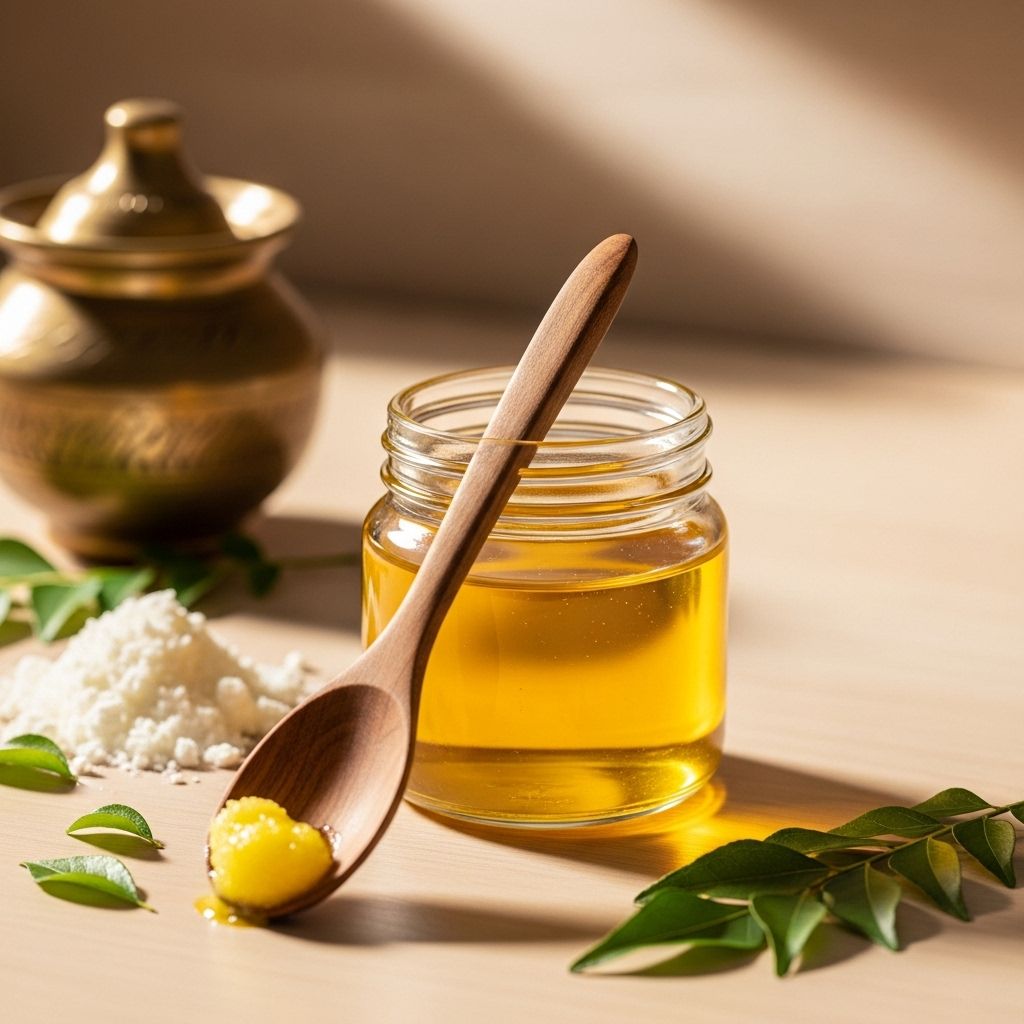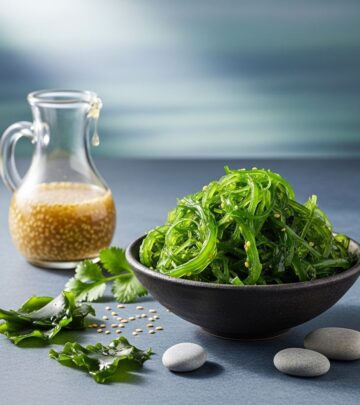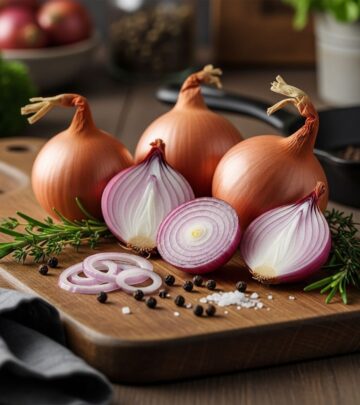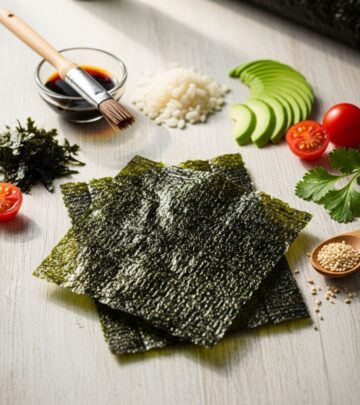Ghee: Health Benefits, Nutrition & Everyday Uses
Nutrient-rich fats fuel digestion, calm inflammation, and promote a radiant complexion.

Ghee, also known as clarified butter, is an ancient staple of Indian cooking and Ayurveda celebrated for its unique flavor, nutritional profile, and medicinal properties. Revered across cultures, ghee has recently gained attention among wellness enthusiasts for its potential health benefits, nourishing fats, and culinary versatility.
What is Ghee?
Ghee is produced by heating butter to remove milk solids and water, leaving behind pure, golden, clarified fat. This process gives ghee its rich aroma, nutty taste, higher smoke point, and longer shelf-life than regular butter. Traditionally, ghee is made from cow’s milk and is free of lactose and casein, making it easier to digest for those with sensitivities.
Nutritional Profile of Ghee
Ghee is abundant in healthy fats, primarily saturated and monounsaturated fatty acids, as well as key fat-soluble vitamins and antioxidants. A tablespoon (approx. 14 grams) of ghee typically contains:
- Calories: ~120
- Total Fat: ~14g (with 9g saturated fat)
- Vitamin A: significant amount (supports vision and immune health)
- Vitamin E: antioxidant properties
- Vitamin D & K (in smaller amounts, aiding calcium absorption and blood clotting)
- Omega-3 fatty acids
- Conjugated Linoleic Acid (CLA): may help manage body fat
- Butyrate: a short-chain fatty acid with anti-inflammatory benefits
| Component | Quantity (1 tbsp) | Health Role |
|---|---|---|
| Calories | 120 kcal | Energy source |
| Fat | 14g | Cell membranes, hormone production |
| Saturated Fat | 9g | Supports cell function |
| Vitamin A | 900 mcg | Vision, immunity |
| Vitamin E | 2.7 mg | Antioxidant |
| CLA | Varies | Weight and fat metabolism |
Key Health Benefits of Ghee
1. Promotes Digestive Health
Ghee contains butyrate, a short-chain fatty acid that fuels colon cells and aids digestion. This can help maintain gut lining integrity, reduce inflammation, and support nutrient absorption. Ghee is also said to kindle Agni in Ayurveda, the metabolic fire responsible for digesting and assimilating food.
- Keeps colonic cells healthy
- Enhances absorption of vitamins and minerals
- May soothe conditions like IBS or colitis due to anti-inflammatory properties
- Traditionally used to combat constipation and support regular bowel movements
2. Supports Heart Health
Despite being high in saturated fat, ghee offers monounsaturated fatty acids (especially omega-3s) that contribute to cardiovascular well-being. When consumed in moderation, ghee can help:
- Maintain balanced cholesterol levels
- Reduce inflammation — a risk factor for heart disease
- Provide antioxidants that counter oxidative stress
Modern research suggests ghee does not significantly raise harmful LDL cholesterol when used as part of a healthy diet, possibly due to its unique fatty acid profile.
3. Strengthens Immunity
Ghee is a rich source of fat-soluble vitamins (A, D, E, K), which are essential for immune cell functioning. Its antioxidants aid the body in fighting off infections, inflammation, and chronic disease.
- Helps strengthen immune defenses
- May reduce inflammation throughout the body
- Supports recovery and cellular repair
4. Anti-inflammatory Properties
The butyrate and CLA in ghee have proven anti-inflammatory effects, and topical use is also popular for treating skin burns, redness, and swelling.
- Soothes joint pain and stiffness
- May help relieve arthritis symptoms
- Aids wound healing when applied externally to skin
5. Enhances Skin and Hair Health
Ghee’s nourishing fats, antioxidants (Vitamin E), and anti-microbial properties make it a prized remedy for glowing, hydrated skin and strong hair.
It is traditionally applied to:
- Moisturize and soften skin
- Repair cracked lips, hands, heels
- Natural glow and complexion enhancement
- Reduce irritation and heal minor burns or wounds
- Lighten dark spots, fade scars and stretch marks
- Reduce dark circles
- Rejuvenate eye skin
- Combat premature aging due to free radicals
- Maintain healthy hair by reducing dryness and breakage
6. Boosts Metabolism and Supports Healthy Weight
Ghee contains medium-chain fatty acids and CLA, both associated with improved metabolism and reduced body fat when consumed in moderation.
- Aids in burning calories
- May help manage healthy weight and body composition
- Provides quick energy to fuel physical and mental tasks
- Traditionally recommended to help underweight individuals gain healthy weight due to its nutrient density
7. Hormonal and Reproductive Balance
Ghee contains nourishing fats which are vital for hormone production and balance. In Ayurvedic tradition, it enhances fertility and regular menstrual cycles in females, while supporting testosterone and muscle strength in males.
- Supports menstrual and reproductive health
- Assists fertility in both men and women
- Promotes muscle mass and energy (especially for men)
8. Joint Lubrication and Pain Relief
The lubricating quality of ghee, along with butyrate’s anti-inflammatory properties, makes it beneficial for joint health.
- Reduces joint pain, stiffness, swelling
- Improves mobility and physical comfort
- Supports long-term joint flexibility
9. Brain Function and Cognitive Care
Ayurvedic medicine classifies ghee as a medhya rasayana: a substance that rejuvenates the brain and supports mental abilities.
- Vitamin A and E protect brain cells from oxidative damage
- May enhance memory, concentration, and clarity
- Believed to cross the blood-brain barrier, nourishing the mind directly
10. Provides Internal Warmth and Energy
Medium-chain fatty acids in ghee swiftly convert to energy, stoking “digestive fire” and providing internal warmth, especially valuable during cold weather.
- Helps raise body temperature naturally
- Prevents lethargy in winter
- Stimulates metabolism and digestive process
Ayurvedic Benefits and Unique Properties
Ghee is celebrated in Ayurveda for its ability to balance doshas — pacifying Vata and Pitta, while its nourishing qualities make it ideal for those seeking rejuvenation and tissue repair. It acts as a carrier (Yogavahi) for herbal formulations, improving absorption and efficacy.
- Enhances longevity and vitality (Ojas)
- Strengthens Rasa Dhatu (body fluids/tissues)
- Lubricates and nourishes all tissues
- Pacifies imbalanced doshas and supports detoxification
How to Use Ghee Everyday
Ghee’s mild, rich flavor and high smoke point (up to 250°C) make it ideal for many culinary uses. Popular methods include:
- Cooking and sautéing vegetables, meats, or grains
- Swapping for butter in recipes
- Drizzling on steamed rice or lentils
- Stirring into coffee or tea for a creamy boost
- Adding to soups or curries for enhanced flavor
- Baking pastries and breads
For skin care:
- Apply a thin layer to dry skin, lips, or heels
- Massage gently into minor burns or wounds (ensure ghee is of food-grade quality)
- Mix with herbal powders for enriched topical treatments
Recommended Intake & Precautions
- Ghee is a concentrated source of fat and calories; moderate intake is advised.
- Most adults can safely consume 1–2 tablespoons per day as part of a balanced diet.
- Individuals with existing heart disease or high cholesterol should consult their healthcare provider before increasing ghee intake.
- Choose “cultured”, organic ghee for maximum health benefits. Not all ghee is created equal; products sourced from grass-fed cows generally have higher nutritional value.
Ghee vs. Butter and Other Oils
| Feature | Ghee | Butter | Vegetable Oils |
|---|---|---|---|
| Lactose/Casein | Absent (removed) | Present | Absent |
| Smoke Point | 250°C | 150°C | 165–230°C |
| Shelf Life | Long (does not require fridge) | Short (requires fridge) | Varies |
| Vitamin A/E/K/D | High | Moderate | Low–Absent |
| Butyrate/CLA | High | Low–Absent | Absent |
| Flavor | Nutty, caramelized | Creamy, rich | Neutral–seedy |
Safety in Cooking: Acrylamide Formation
Research shows that cooking with animal fats like ghee can result in lower levels of acrylamide—a harmful compound—compared to some oils. Animal studies suggest high acrylamide intake may pose cancer risks, so using ghee could be a safer choice for high-heat cooking.
Who Can Benefit from Ghee?
- Individuals with lactose intolerance or dairy sensitivities
- People seeking natural remedies for digestive, skin, or joint concerns
- Those on high-fat diets such as keto or paleo
- Anyone wanting to enrich nutrient intake naturally
- Individuals needing extra nourishment during pregnancy or recovery
Potential Drawbacks & Considerations
- High in calories and saturated fat; excessive consumption may increase heart disease risk
- Those with food allergies should ensure highly refined ghee is used
- Always source cruelty-free and organic ghee for maximum benefit
Frequently Asked Questions (FAQs) About Ghee
Q: Is ghee suitable for lactose-intolerant people?
A: Yes, ghee is almost entirely free of lactose and casein, making it generally well tolerated by those who have dairy sensitivities.
Q: What is the recommended daily amount of ghee?
A: Most healthy adults can consume 1–2 tablespoons per day in cooking or as a supplement, but individual needs may vary—consult your doctor if you have heart disease or elevated cholesterol.
Q: Does ghee help with weight loss?
A: Moderation is key! The medium-chain fatty acids and CLA in ghee may support a healthy metabolism and fat loss, but excess intake can counteract benefits.
Q: Can ghee be consumed raw?
A: Yes, ghee can be eaten raw or incorporated into foods and drinks, but for best flavor and digestion, most prefer it melted or mixed into dishes.
Q: Is ghee safe for children?
A: In small quantities, ghee can offer nutrition and energy for growing children. However, dietary fat intake for children should be guided by a pediatrician.
Q: What are the best ways to store ghee?
A: Ghee keeps well for months at room temperature in an airtight container, away from moisture and direct sunlight. Refrigeration can extend shelf life further.
Q: Does ghee have any side effects?
A: Overconsumption can increase cholesterol and heart disease risk. Always use ghee as part of a balanced diet.
Embracing Ghee in Modern Nutrition
Ghee stands out as a potent, natural fat source combining traditional wisdom and modern scientific backing. When used prudently, it nourishes the body, supports healing, and enriches daily meals with nutrition and flavor. Choose high-quality, ethically produced ghee to maximize health benefits and culinary enjoyment.
References
- https://www.webmd.com/diet/ghee-good-for-you
- https://redcliffelabs.com/myhealth/lifestyle/unlocking-the-power-of-ghee-a-guide-to-its-health-benefits/
- https://www.keralaayurveda.us/courses/blog/the-health-benefits-of-ghee-for-detoxification-cooking-and-skin/
- https://draxe.com/nutrition/ghee-benefits/
- https://pmc.ncbi.nlm.nih.gov/articles/PMC10789628/
- https://www.healthline.com/nutrition/ghee
- https://heartandsoil.co/blog/top-5-ghee-benefits/
- https://nutritionstop.com/blogs/news/unveiling-the-health-benefits-of-ghee-a-guide-to-making-and-using-this-liquid-gold
- https://keralaayurveda.biz/blogs/news/guide-on-ayurvedic-ghee-benefits-and-types
Read full bio of Sneha Tete












